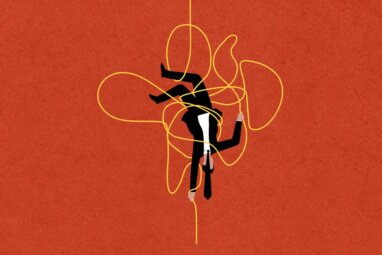Five Traits of Leaders Who Excel at Decision-Making
Leaders who understand how to manage the emotional discomfort of uncertainty are better equipped to make level-headed decisions. Concentrate on five specific areas to improve your ability to be decisive.
Topics

Carolyn Geason-Beissel/MIT SMR | Getty Images
You may feel that this is a time of radical uncertainty, when past patterns no longer reliably predict the future. Uncertainty inherently leads us to a place of emotional discomfort because it signals both potential opportunity and adversity. Neuroscience shows that powerful and automatic brain responses are simultaneously triggered in the form of approach emotions (excitement) and avoidance emotions (doubt and anxiety). Because the resulting state of ambivalence is tense and painful, there is a potential rush to ill-considered action, whether it be to grasp opportunity or forgo it as quickly as possible.
I recently collaborated with HSBC to study the question of how we can empower more people with effective decision-making skills in a world of complexity and disruption. We sought to identify global trends in emotional responses to uncertainty, as well as the tendencies that predict strong decision-making abilities within this context. The study involved 17,555 individuals across 12 markets, including more than 3,000 business participants ranging from leaders of small and medium enterprises to executives of multinationals. Respondents shared details on how they made, are making, or plan to make decisions at some of their biggest personal and professional moments.
Our research report, “Seizing Uncertainty,” reveals that effective decision makers share five key attributes that emotionally equip them to overcome the decision paralysis caused by doubt and anxiety — and enable them to undertake effective action when faced with uncertainty. It’s a vital skill: Nearly half of respondents reported that they often feel regret “at not taking opportunities when they have passed me by.” This means that unless leaders learn to manage the emotions involved in decision-making, they could suffer, as may their organizations.
Five Traits of Leaders Who Handle Uncertainty Well
What is it about the leaders who can deal with uncertainty well compared with their peers? Here is what we learned. Collectively, these are the skills leaders and organizations can prioritize strengthening.
1. They view change positively.
One key attribute linked to effective decision-making under uncertainty is that these leaders feel equipped to deal with change.





Comment (1)
Rick Amerson